How to Disinfect Musical Instruments During Covid-19
We spoke with luthier Nicole Alosinac about how to disinfect musical instruments, the most common methods, and how they could react with your gear.
With the spread of COVID-19, there’s been an increased need for sanitization. People are hard-pressed to find hand sanitizer, disinfecting wipes, isopropyl alcohol, and other options in stores. And while we’re glad that people are taking hand-washing seriously, we’re left wondering… what about how to disinfect our musical instruments?
Even though the bulk of our performing and practicing right now is at home, we still need to sanitize. After all, who knows who touched your gear before social distancing, or what you might be bringing home from the grocery store.
While we aren’t disease control experts, and this article can’t make any guarantees, we’ve outlined some general recommendations for how to disinfect musical instruments to keep yourself and your beloved gear as germ free as possible.
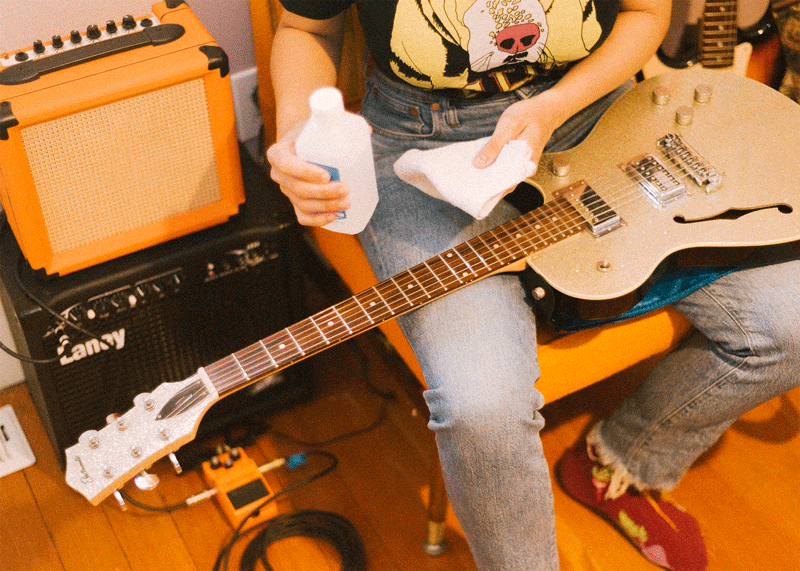
How to Disinfect Musical Instruments
When we play guitar or bass, our hands and fingers touch almost every part of the instrument, including the tuning pegs, strings, body, knobs, and neck. If you play piano or keyboards, your exposure to the instrument is mostly the keys themselves.
The problem with sanitizing gear is that you often can’t use the same cleaning supply for every component. Even between individual guitars, pianos, and keyboards, you’ll find vastly different recommended cleaning supplies.
We talked to Vancouver, BC-based luthier Nicole Alosinac about the most common methods of disinfecting surfaces, and how those different methods could react with your instruments.
Rubbing Alcohol
Isopropyl alcohol that’s above 70% can kill COVID-19, according to reports—but it doesn’t always play nice with your instrument. Alosinac uses isopropyl alcohol at times, but only on the strings and unfinished fretboards (e.g., rosewood or ebony): “You can wipe down the strings and a rosewood fingerboard with alcohol, but I wouldn’t wipe down the body or back of the neck with alcohol… Typically, if there’s gunk on the fretboard, I’ll get it off with rubbing alcohol. I’ll put it on a shop towel and wipe it just on the fingerboard itself, sometimes scrubbing with an abrasive brush. This is only if it doesn’t have a maple neck. If it’s rosewood or ebony and the grain is open, you can clean it like that.”
But what about the drying properties of isopropyl alcohol? Alosinac isn’t concerned: “[After you clean the neck] you can polish the frets and go over the wood with some lemon oil so it doesn’t dry out.”
If your guitar or bass is finished top to bottom with thick poly (think those hard, plastic-esque finishes), isopropyl alcohol is probably safe to use, but could still leave a mess. “It’s not going to damage a poly finish, but it can leave white streaks behind,” says Alosinac. “Those [streaks] will polish off, but I don’t think it’s worth it.” Test it on a small part of your guitar body (under the pickguard) and neck first to make sure there isn’t an unwanted reaction.
If you’re not sure what your guitar has been finished with (i.e., what the wood has been sealed with), DO NOT use isopropyl alcohol. “Poly is pretty immune to alcohol, but it would make a mess of nitro, and it would eat right through French polish.” Nitro finishes are common on vintage guitars and French polish is typically only used on classical instruments.
For keyboards, if your gear is plastic, isopropyl alcohol is probably fine. However, those who have physical pianos should never clean them with isopropyl alcohol because it will negatively interact with the finish of a piano and could cause the glue that keeps the keys together to dry out and pull apart.
DO: Clean strings, open grain fretboards, plastic, and metal components with isopropyl alcohol. Clean polyurethane finishes if you’re okay with polishing out any white streaks.
DO NOT: Use on nitro or French Polish finishes or piano keys. It can destroy wooden finishes and cause piano keys to separate.
Soap and Water
We’ve all learned by now that washing your hands for 20 seconds can kill COVID-19. However, Alosinac recommends against sudsing up your guitar, especially if it has an open or unfinished grain.
“I think the amount of time you would need to wipe it, you could do some damage to the finish… I definitely wouldn’t use soap and water on an unfinished fingerboard, because that will suck in the moisture and it could swell the wood and change the pitch of the neck.”
The gist of it is, “You just don’t want quick and sudden changes in moisture or humidity with your guitar.”
With piano keys, it’s fine to use soap and water. This applies to both keyboards and traditional pianos—just be sure to use a mild dish soap, avoid using too much water (you don’t want to drench the keys), and use an uncolored cloth to prevent color bleeding. Also be sure to wipe longways up and down each key, not side-to-side. Work one octave at a time, and dry in between octaves.
DO: Clean traditional piano keys, metal, and plastic components.
DO NOT: Clean guitar bodies, necks, or any wooden surfaces with soap and water.
Give It Time
We still don’t know how long COVID-19 lasts on surfaces (previous estimates had suggested weeks); however, a study published on March 13, 2020 found that COVID-19 can last:
- 3 hours post aerosolization (i.e., cough droplets in the air)
- 4 hours on copper
- 24 hours on cardboard
- 2-3 days on plastic and stainless steel (and likely other hard surfaces)
With that in mind, one option is to simply quarantine your instruments for a few days. It might be rough, but it’s an absolutely damage-free way to make sure your instruments are free of COVID-19. If you have any vintage or fragile instruments you don’t want to take any risks with, this is the best bet for you.
DO: Let your instruments sit for three days as recommended by the CDC.
DO NOT: Touch them sooner than 3 days if you think they have been exposed to COVID-19.
UV-C Lamps
Also known as germicidal lamps, UV-C lamps aren’t particularly common outside of laboratories and medical facilities, but they will kill all manner of germs and viruses. The most common commercially-available germicidal lamps are UV-C LED lamps, which use short-wave ultraviolet lights to inactivate viruses. These devices are often sold as wands that you can turn on and wave over surfaces to disinfect them.
It’s important to keep in mind that exposure to UV light is terrible for us—it can cause skin cancer, just like any long-term exposure to the sun. That’s why medical facilities that use UV-C lamps typically have processes in place to prevent overexposure to the UV rays, including education and training.
But hey, if you know someone with access to a UV-C lamp who knows how to safely use it, you might want to ask them for help—Alosinac even has one in her shop for curing new finishes faster. Short exposure to a UV-C lamp will disinfect your instruments without long-term damage; however, longer-term exposure can give your instrument a more aged or reliced appearance, so we’d recommend limited exposure.
By now you might be wondering about UV rays from the sun. Alosinac doesn’t see this as an effective sanitization method, since putting your instrument in the sun for a few hours isn’t guaranteed to kill a virus, and precariously exposes it to the elements. And she’s right: UV-C lamps produce intense and specific UV rays that are ideal for killing COVID-19 in a controlled environment. Thanks to the ozone protecting us from too many UV rays, you don’t get that with sunlight.
DO: Follow any recommended directions and precautions with UV-C lamps.
DO NOT: Operate UV-C lamps without proper protection, which may include gloves and sunglasses. Do not leave your instruments out in the sun.
How to Disinfect Your Microphones
Of all the gear you use, microphones are most likely to spread germs and viruses. After all, respiratory diseases like COVID-19 are spread primarily through droplets from sneezing, coughing, talking, or even singing.
Cleaning Dynamic Microphones
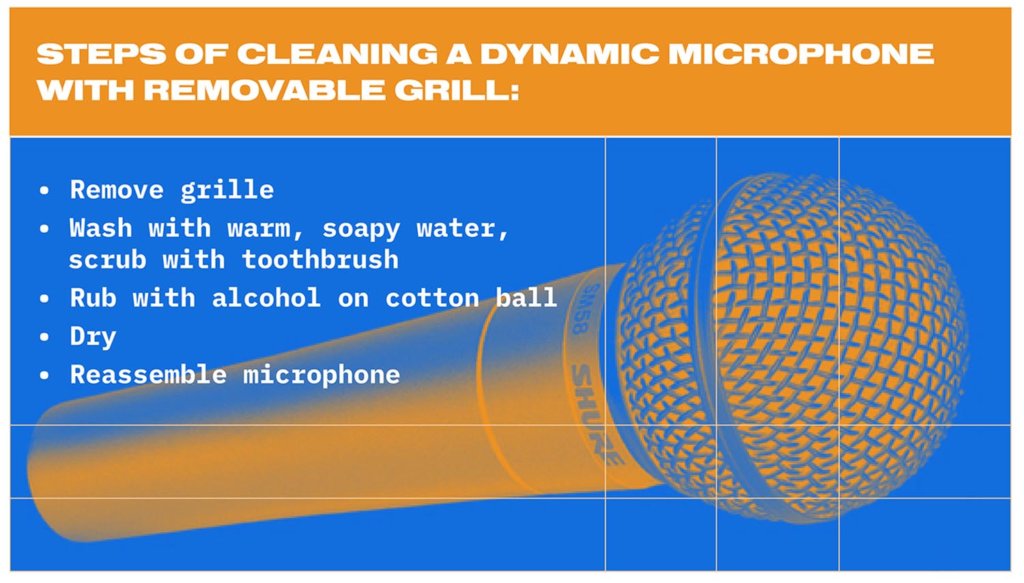
For a quick fix, simply wipe the grille or screen of the microphone with isopropyl alcohol on a cotton ball or antibacterial wipe. It won’t cause any damage as long as the microphone doesn’t get saturated. And, of course, make sure the microphone isn’t plugged in when you’re doing any cleaning.
For an in-depth cleaning (which we recommend you do from time to time, anyway), remove any grilles or screens from your microphone. For something like a Shure SM58, this is as simple as unscrewing the top.
If you don’t want to use a disinfectant as harsh as isopropyl alcohol (or if you can’t find any), soap and water should be sufficient to clean and disinfect your microphone. Just give it the same attention you give your hands. You might even want to use a toothbrush with soft bristles to get a good clean.
Otherwise, a rinse with warm water and isopropyl alcohol on a cotton ball should do the trick. Just be sure to let it dry before reattaching it to your microphone.
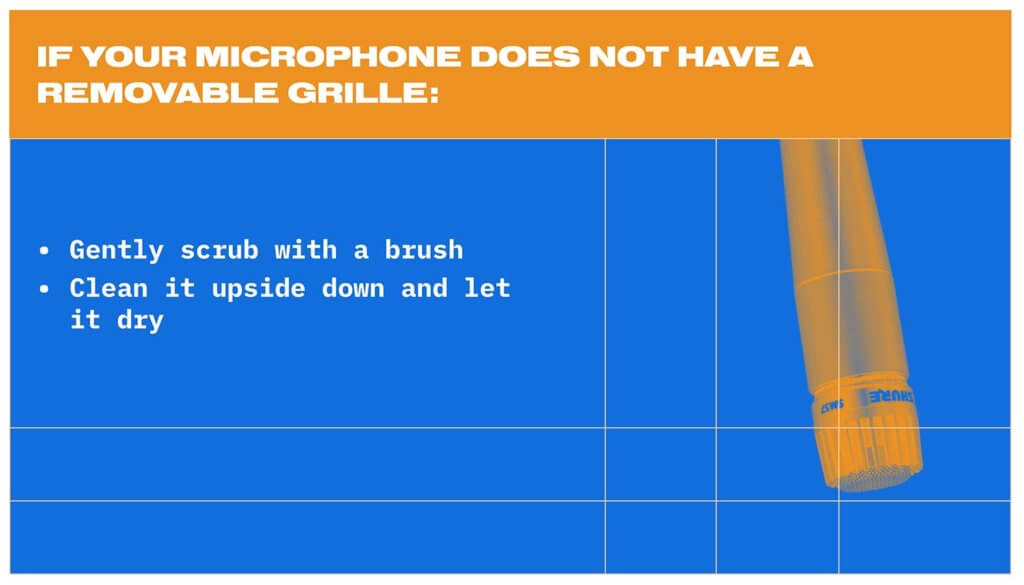
If your microphone doesn’t have a removable grille (e.g., Shure SM57), you’re going to have to be more careful. Hold the microphone upside down while you clean it to avoid moisture from leaking into the microphone. Then take a toothbrush that’s been wetted with isopropyl alcohol and gently scrub.
DO: Remove grilles where possible. Gently clean your microphones upside down when grilles cannot be removed.
DO NOT: Saturate your microphones with any liquid.
Cleaning Condenser Microphones
According to Shure, “never use water or any other liquid for cleaning purposes” on condenser microphones. That includes isopropyl alcohol.
If your condenser mic has a removable grille (like a Beta 87), you can remove and clean that like a dynamic mic. If not, we recommend letting it sit for a few days to kill any germs. We’d also recommend investing in an external foam windscreen for your condenser mics if you plan on using them in highly-trafficked settings and are concerned with germs, as those can be removed and washed easily.
DO: Remove grilles where possible. Invest in removable windscreens if there are no removable grilles. Let condenser microphones that may have been exposed to COVID-19 sit for three days.
DO NOT: Attempt to disinfect condenser microphones without removable grilles with any liquid.
The Bottom Line
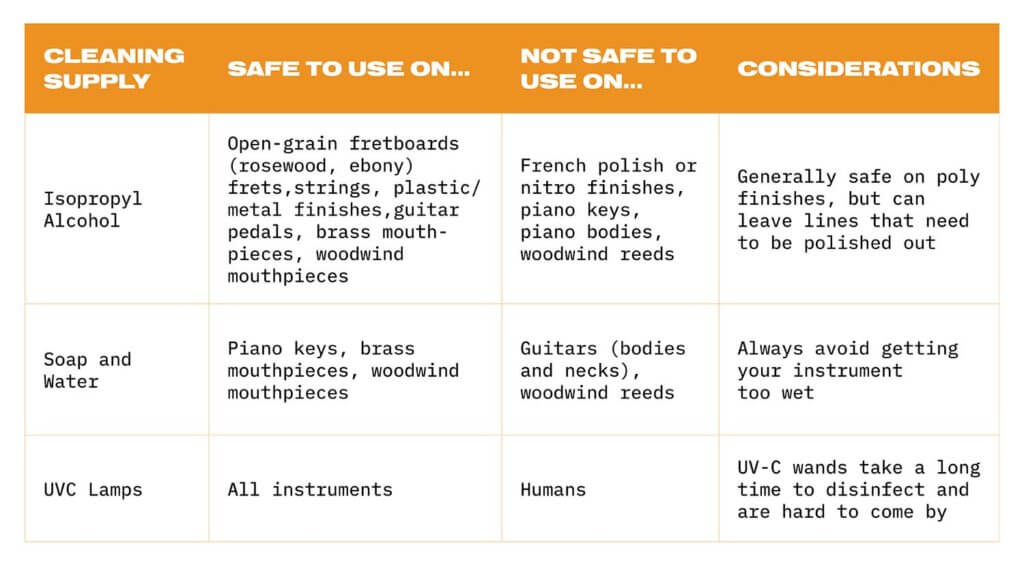
Most of us probably give our guitars a good wipe and a polish now and then to keep them looking and feeling clean, but disinfecting a guitar isn’t an easy process. However, if you follow our guidelines, you should be able to disinfect your instruments without causing any long-term damage.
When it comes to vocal microphones, on the other hand, we recommend implementing a policy of disinfecting with more regularity. It’s easier to do for most mics, and a simple spray or wipe down won’t hurt most of them.
With that in mind, we recommend keeping your guitars and instruments to yourself for now. “I wouldn’t be sharing instruments at this point,” says Alosinac. “Wash your hands before you pick up an instrument, and wash your hands when you put that instrument down.”
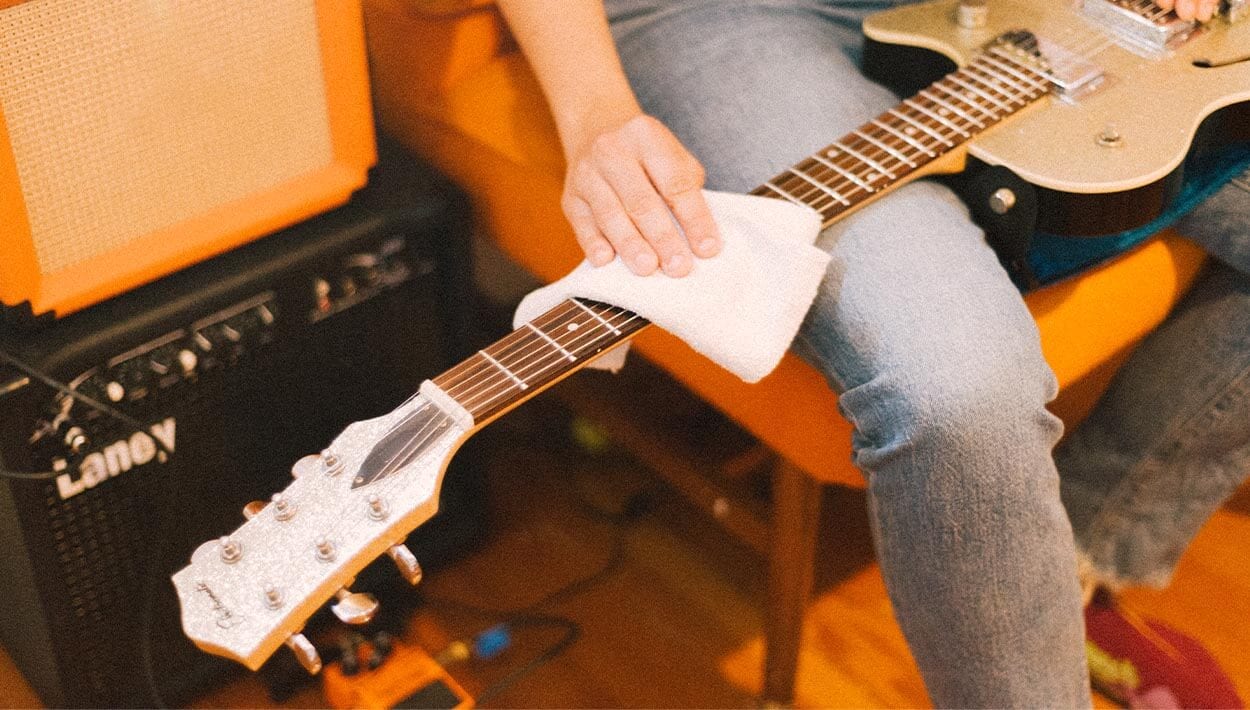

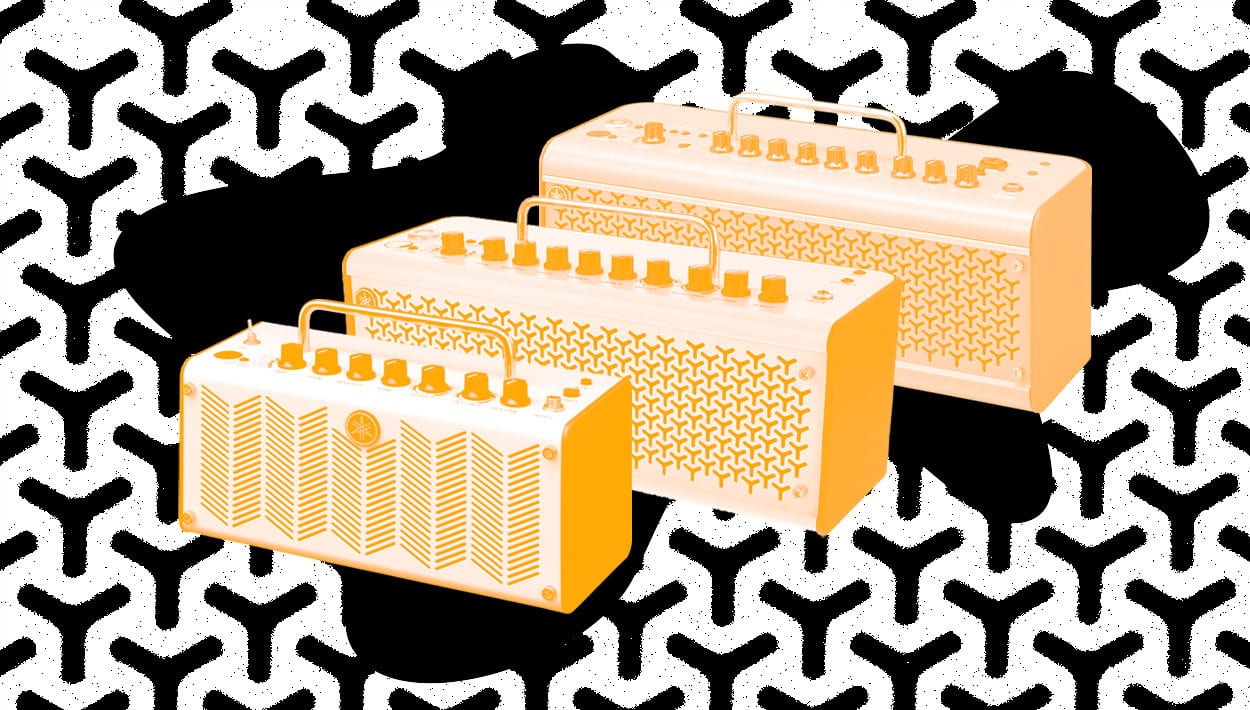



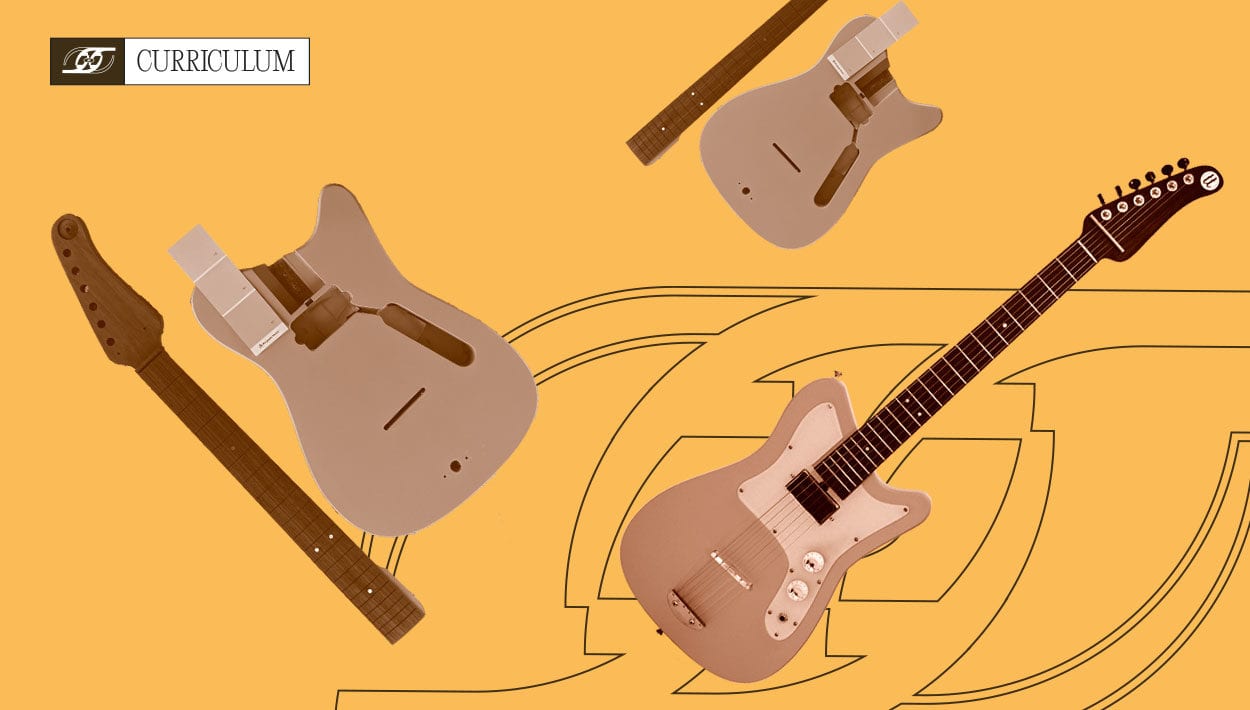
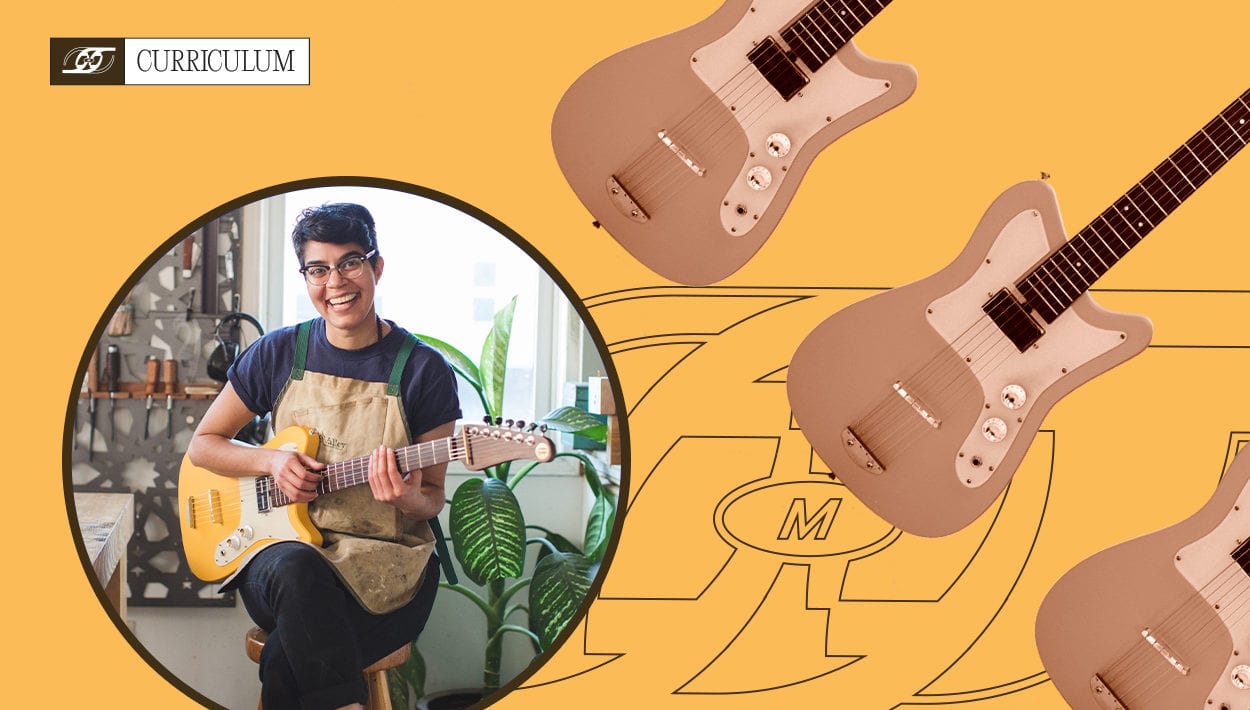
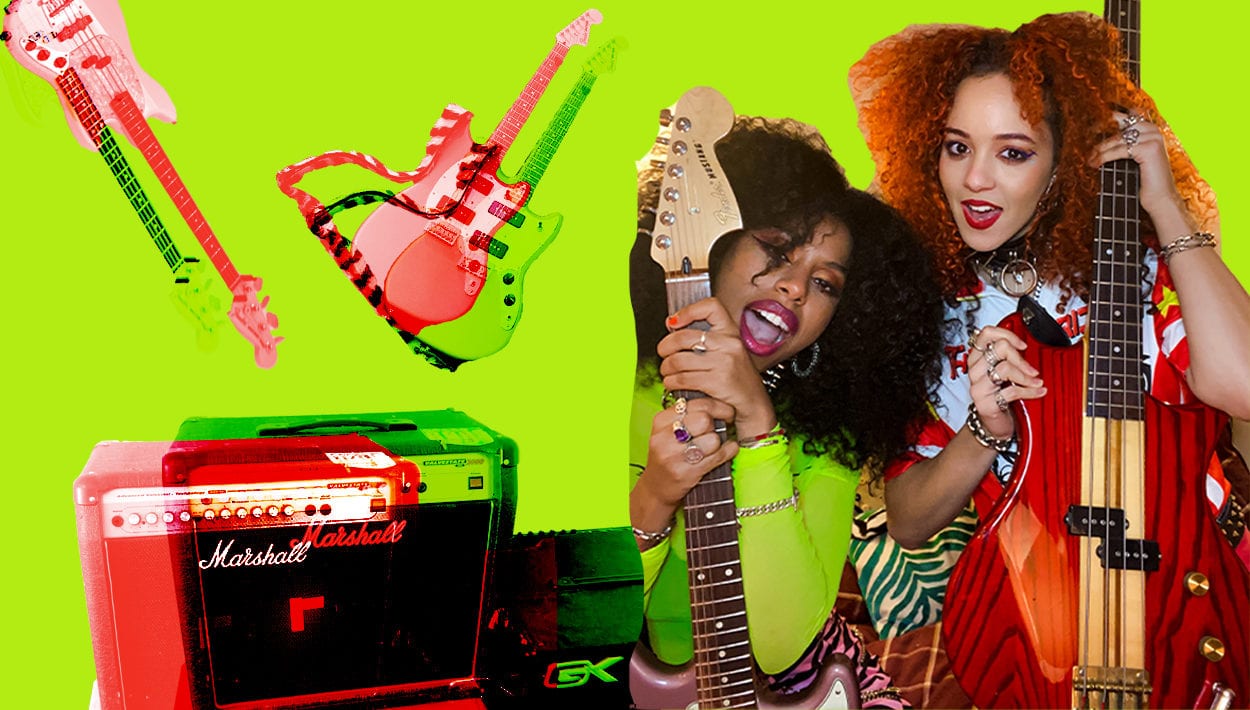


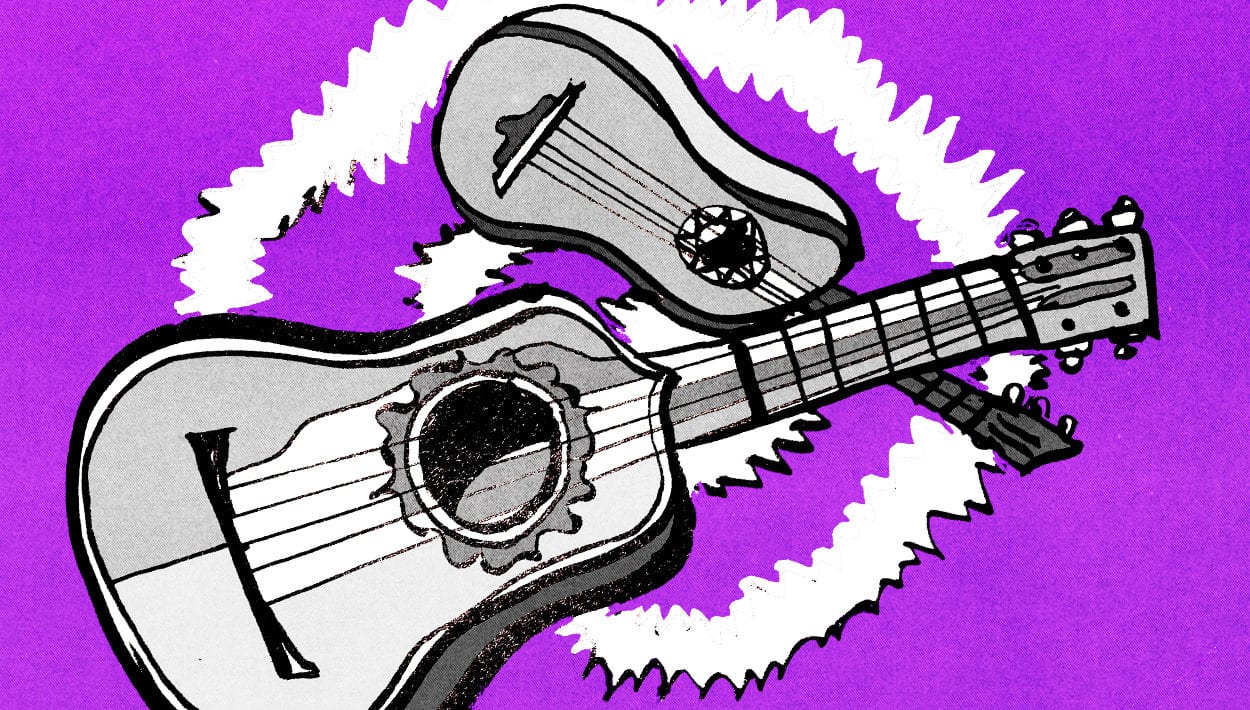


Comments
Really one of the best articles I’ve read. Thanks a lot, It’s really useful for me.
Comment by Alyna Watson on August 4, 2020 at 5:40 amThank you, I’m opting for the quarantine.
Comment by Dora Hinojosa on September 11, 2020 at 11:15 amThanks for this. Super informative, 100% useful for us!
Comment by Matt on March 12, 2021 at 5:17 amGuitar Repair Toronto
great one! i need this in these quarantine times! Alluros
Comment by Andrea Estrada on August 5, 2021 at 8:20 pmWell done with this article! I really like the way you present it and the way you make it interesting
Comment by drift boss on August 30, 2021 at 6:38 pmHowever, disinfecting an instrument to make it safe to handle will last longer and is easier to achieve.
URL: https://waterlooturf.com/
Comment by Claire Smith on October 13, 2021 at 7:43 amThanks so much Emily! My guitar shows up tomorrow and I’m already freaking out about COVID19 and how to ensure I disinfect the guitar as well as possible.
Comment by Angela Austin on December 15, 2021 at 5:11 amGood one! The top 3 fun fashion looks for fall activities are really wonderful! blog & very informative to me thanks a lot for sharing this great! article
Comment by Darcy James on June 13, 2022 at 12:44 amI find a lot of interesting information whenever I visit your website, which I do frequently. Not only are there some wonderful articles, but also some wonderful comments. I am grateful to you, and I hope that you will spread the word about my page.
Comment by foodle on July 14, 2022 at 1:40 amI had a lot of harvest after seeing this post of yours! Before, I used to play games, this is a fun game for entertainment, but now I will follow you, read your articles will have more knowledge. foodle
Comment by game on July 14, 2022 at 1:41 amSo, Don’t miss a single moment of the nfr live action. Don’t worry, If you can’t attend in Las Vegas nfr, we’ll discuss it here nfr live Match
Comment by Maren Mueller on February 4, 2023 at 9:56 amGet the productive Buyers from B2B Buyers Directory Now
Comment by B2B Buyers Directory on February 13, 2023 at 3:04 amnice post . Thank you for posting something like this
Comment by website on March 14, 2023 at 6:50 pmwebsite
nice article, waiting for your another 🙂 commercial drywall
Comment by Amy Edington on March 19, 2023 at 11:13 pmYou have always been a great source of fruitful information. Keep Posting! Thanks
Comment by Tennis Grand Slams on April 30, 2023 at 11:06 amThe Rice Purity Test is a self-graded survey that aims to measure a person’s level of ‘innocence’ in worldly matters, primarily focusing on topics such as sex, drugs, deceit, and other activities considered ‘impure’. Originally designed by Rice University for its incoming college students, the test features 100 yes/no questions. The scoring is based on the number of ‘no’ answers, with a higher score indicating a higher level of ‘purity’. It’s important to note that this test is often taken lightheartedly and should not be used as a measure of one’s value or worth.
https://rice-purity-test.net/
Comment by Innocence Test on May 11, 2023 at 11:49 pmHey everyone! If you’re a fan of dramas, you have to check out DramaCool. They have an amazing collection of captivating shows. Click here to explore DramaCool and indulge in your favorite dramas!”
Comment by Zamin Abbas on June 29, 2023 at 11:15 pmThis post explains this amazing thing well enough for someone to understand it, and I’m sure everyone will like it
Comment by Quordle on August 17, 2023 at 6:51 pmThere are many genres that you have played, but you might have overlooked one. Let’s test it out right away!
Comment by word wipe aarp on September 13, 2023 at 1:41 amI think so, too
Comment by flagle on November 6, 2023 at 10:54 pmhttps://www.nytimeswordle.org/
Comment by nytimeswordle on November 27, 2023 at 7:17 pmWordle Nyt you get six chances each day to identify the secret wordle Game. The color of your word’s tiles will change after each guess to indicate how close you came to getting it right New York Times Wordle.
thank you dear for this blog
Comment by hitactress on February 3, 2024 at 7:59 am